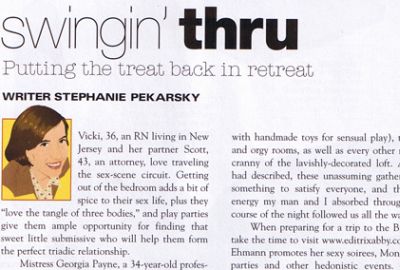The Freelance Writing Book That Will Take You From Small Potatoes to Professional
23
How to Play the Waiting Game Just Right
16
How To Achieve Full-Time Success with Part-Time Hours
8
Spill It: Are You a Terrible Self-Starter?
4
 Last week, I headed over to my local library to sit in on a meeting of the Toastmasters Club. When we went around the room to introduce ourselves, I admitted that I was on a panel at a major conference that coming weekend, that public speaking terrified me, and that I was hoping to pick up some pointers.
Last week, I headed over to my local library to sit in on a meeting of the Toastmasters Club. When we went around the room to introduce ourselves, I admitted that I was on a panel at a major conference that coming weekend, that public speaking terrified me, and that I was hoping to pick up some pointers.
So when it came time for impromptu, two-minute presentations, the master of ceremonies (the Toast Master?) asked me to take the first shot and talk about the presentation I was preparing for.
Fantastic.
I got up there and babbled incoherently for just under two minutes about ASJA, sex writing, the book I was working on, and promotional plans. It wasn’t terrible. But it was definitely unfocused, and I was obviously nervous.
(A few presentations later, a guy with fantastic biceps opened up his presentation by saying that my presentation was his favorite. But I’m pretty sure it’s because no one expects to come to the public library, attend a Toastmasters Club meeting, and hear somebody talk about sex.)
ANYway. At the end of the meeting, I received some more constructive feedback from the person tasked with analyzing each mini-speech, and one thing he said stuck out to me. “People tend to use filler words (stuff like uh and um) in the same way they clear their throat,” he said. “You feel unprepared, so you fill in those words while you gather your thoughts.”
It struck me then that my tendency toward extreme procrastination is much the same thing.
When I receive a new assignment or get the go-ahead on a new project, I don’t immediately start drawing up outlines and tracking down resources (as I probably should). Instead, I put the deadline into my Google Calendar and set up an email alert, so that I’ll be sure to start soon enough to meet my deadline.
Then, when that email shows up in my inbox, I hem and haw even further.
I do some spring cleaning of my Chrome bookmarks.
I decide the coffee table needs dusting.
The prospect of cleaning out the kitchen sink is suddenly attractive.
I draw up to-do lists, which make my already-existing to-do lists even more impossible to manage.
And I do all of this not because I’m a terrible freelancer who can’t be trusted to complete her work. (I always meet my deadlines.) I do this because… well… just don’t know how to start! I still need to gather my thoughts!
Some people recommend writing what Anne Lamott refers to as a “shitty first draft.” This is excruciating for me.
Other people (including me) advocate breaking a larger project down into smaller, more manageable tasks, so as to make it less overwhelming. I do this a lot of the time.
One of the things that helps me most is drawing up an outline. Once I have an outline down on paper, the rest of the assignment seems easy as pie.
What about you? Do you procrastinate? Do you suck at the self-starting?
How do you trick yourself into getting down to business?
Related: How to Break Through Your Work Block, Getting It Done
Top-Notch Marketing Tool: The Panel
1
 This past weekend, I attended the ASJA 2012 Writers Conference, which I had been freaking out about for months. I was invited to speak on a panel about sex writing and, not only did the prospect of speaking to a crowd of professional journalists and authors intimidate me, but I felt self-conscious about the fact that I was the only panelist without a book. (It didn’t feel right to count the ebook I’d co-authored the other year.)
This past weekend, I attended the ASJA 2012 Writers Conference, which I had been freaking out about for months. I was invited to speak on a panel about sex writing and, not only did the prospect of speaking to a crowd of professional journalists and authors intimidate me, but I felt self-conscious about the fact that I was the only panelist without a book. (It didn’t feel right to count the ebook I’d co-authored the other year.)
I worried: Would attendees think I wasn’t accomplished enough to give them advice? Would they roll their eyes as I hid behind my notes and stuttered over my words? Would they riot over the fact that the organization had allowed such a poor public speaker to have access to the mic? (I have an over-active imagination… )
As per usual, I was overreacting, and I made it through the panel alive. And after that, I was able to enjoy the other panels and presentations throughout the day. I found it to be a great opportunity to see how others structured their panels. I was able to see what worked, and what didn’t. And at the end of the day, I was convinced: I should do this again.
Putting together a panel — whether at a major conference or as a smaller, standalone event — can be a great marketing tool. It can help you establish yourself as an expert. It can bring you into contact with other luminaries in your field. It can raise your visibility. It can strengthen your writing resume. It can even act as a source of income!
But putting together a successful panel? That’s something else.
Here’s what I learned from just one day at the ASJA conference:
Make It a Conversation. For our Writing About Sex panel, we each gave a 10-minute presentation, and then segued into the Q+A. Which was fine, because we each had something slightly different to share (I spoke about the variety of sex writing markets out there; Rachel Kramer Bussel spoke about submitting to erotica markets; Rae Francoeur spoke about writing literary erotica; and Joan Price spoke about promoting your sex writing). But sometimes lectures (even mini-lectures) are not as engaging as conversations.
In contrast, when I later attended Breaking Through to Online Business Markets and, later still, What’s Next Once Your Book Comes Out, the moderator asked the other panelists questions, which they each answered in turn. It allowed each panelist to share their slightly-different perspective on the topic at hand, and also broke things up in such a way that the audience remained engaged.
Noted.
Make It Focused. Another thing my panel — and others throughout the day — had in common is that they were aimed at two different audiences. For example, our sex writing panel was aimed at both nonfiction sex writers and erotica writers. Other panels were aimed at both freelance article writers and book authors. In some cases, attendees may be interested in both areas. But oftentimes, a writer who is in the mag-querying mindset is not in the book-writing mindset, and vice versa.
Which means that half your audience may find their eyes glazing over for half your presentation.
And there’s nothing scarier than staring out into a sea of writers and seeing bored faces.
Think carefully about the audience you want to reach, and what you want their takeaway to be.
But Not Too Focused. I attended Breaking Through to Online Business Markets because — I don’t know — sometimes it’s nice to write about something other than sex. The three panelists there were editors for three different business/financial publications and, as such, they shared a lot of super-fantastic advice on what their publications were looking for, and how best to pitch them.
I loved getting that insider perspective but, in some ways, it was too specific. What about the other business/financial publications out there? As a beginning business writer, how could I break into that niche in general?
I left the panel feeling that maybe I wasn’t ready to break into that market, though I certainly had the lowdown on how best to pitch those particular publications once I’d become a more seasoned business writer.
Provide Value. Of all the service content I read online, my favorite posts are always the ones that provide clear, step-by-step instructions for getting things done, concrete ideas, and valuable resources. Unfortunately, most of the posts I come across are a lot more general than that, providing inspiration and empowerment, but no clear tips for reaching my goals. These posts provide me with a boost of excited optimism… but then leave me hanging, asking myself: What’s next?
How can you provide value? It’s an important question to ask yourself when drawing up blog posts and newsletters and, in the same way, it’s an important question to ask yourself when putting together a panel.
My fellow panelists and I focused on specifics when giving our presentations. I, for example, mentioned specific publications, the columns they were looking to fill, and their pay rates. I even included editor contact info in our online handout. Similarly, at the What’s Next Once Your Book Comes Out panel, the panelists shared creative ideas for book promotion and, in their online handout, included a slew of resources, including Jenny Blake’s uber-comprehensive, 15-tab, book marketing spreadsheet. Now that’s what I call value!
Brainstorm how you can help your audience take action now.
For the love of god, go off-book. When I first started talking during our panel, I made eye contact with the audience, filling them in on my background as if we were having a casual, one-on-one chat. But as I went on, diving into the nitty-gritty of publications and pay rates, I found myself relying more and more on my notes. I was making less eye contact with the audience, and I could even hear my voice transitioning into Boring Lecture Mode.
If you’d gotten the chance to take a peek at my notes, you would’ve seen that I’d typed out every goddamn word I wanted to say. I was so afraid my mind would go blank, or that I’d start having a panic attack, that I didn’t want to leave anything to chance.
In contrast, when I looked over at Rachel’s notes, I saw a single, scribbled-on piece of paper containing headings and bullet points. And that’s about it.
As a result, she was able to maintain that casual air, and keep her audience engaged.
Color me jealous.
Speak Loud, Clear, and Slow. My middle school history teacher always used to tell us this. It’s a good mantra to remember. Yet I always seem to devolve into full-blown panic, mouth drying up, sentences coming faster and faster so that I inevitably stumble over my words. Consider me your cautionary tale. Use me as an example of what not to do.
(I’m actually considering joining the Toastmasters Club as a way to get more confident with public speaking, and receive feedback on my presentations. I went to a meeting the week before the conference, and it actually eased some of my fears.)
Get the Audience Involved. Q+As are obviously a great way to do this, and are standard at many public presentations. But I thought it was an especially inspired move on Rachel’s part when she asked our audience members to share the negative repercussions they’d experienced as a result of their sex writing. (Kayt Sukel’s description of the creepy emails she receives from creepy dudes? Priceless.)
How else can you get them involved? Worksheets? Pitch session? Ice breaker? Get creative!
Anyone else out there been to an especially good panel? What stood out for you? What worked and what didn’t?
Related: How to Throw an Event That Rocks the House, Are Professional Organizations Worth the Cost?, How to Market Yourself: Getting Out More
Create the Life You Want… Not the One You Think You Should Want
26
 Almost two weeks ago, I was on the phone with a reporter from a national magazine, talking about solopreneurship and personal branding. We were having a lovely chat — though I felt like a bit of a spaz; that’s why I’m a writer, you guys — when he asked me about my income.
Almost two weeks ago, I was on the phone with a reporter from a national magazine, talking about solopreneurship and personal branding. We were having a lovely chat — though I felt like a bit of a spaz; that’s why I’m a writer, you guys — when he asked me about my income.
“I make about $30k a year,” I told him.
“You can live on that!?” he asked.
I mentioned that I was lucky enough to have a husband who made way more money than me, so that I could create a life in which I only worked part-time hours. I told him I was building a career in which I could stay home with my future (as-yet-unconceived) children and not take a huge, unprepared-for blow to my paycheck. And if I needed more money, I said, I could always hustle a helluva lot more instead of sitting back and letting the work come to me (which is my current, lazy-ass m.o.).
He asked me what I’d do if a media company offered me a staff position at $75k.
“I’d turn it down,” I said. “No question.”
“What about $100k?” he asked.
“Nope,” I said. “I never want to give this up.”
Two days later, my bread-winning husband lost his job.
I had just arrived home from yoga when he called me. I was feeling loose, relaxed, happy. I didn’t realize who it was at first. Then: “I have bad news. I was just laid off.”
I told him everything would be just fine. After all, he had a ton of great contacts in the industry (he’s a web developer), plus this could give him the chance to focus on his own business (which, at the moment, he just does on the side). Then I hung up and started crying and, in a panic, spent the next three hours looking at job ads.
Pretty much everything I tell my clients not to do.
At that point, reason took hold and I reached out to my network. (Also, Michael eventually came home and told me to chill the eff out.) Within a week’s time, I had a new coaching client, a new ghostwriting project, two new, prospective ghostwriting clients, and yet another ghostwriting project on the horizon. And Michael had five trillion job interviews and his first job offer. (He’s lovable and stuff.)
I’ve been reading Danielle LaPorte’s The Fire Starter Sessions these past two weeks, and I felt a click when I read her chapter on money. In it, she writes:
Do you want to make a million bucks a year? Why? For what? Do you really need it to do what you want to do and be who you want to be this lifetime, or do you need more? How much will be enough if you’ve reached your lifestyle goals? And who really needs ‘more than enough’?
This passage reminded me of an exercise I’d done when reading The Wealthy Freelancer. Early on in the book, Pete Savage had asked readers to write up a description of their ideal day, so that they could then plan a means of getting closer to it.
What was weird was that I wasn’t as far off from my ideal day as one might think.
It also made me think of Laura Vanderkam’s All the Money in the World, in which she asserts that we already have all the money we need… but can easily get more if times get tight.
You guys! They’re totally right!
What I’m saying is… my response to that reporter still stands. Keep your $75k. Keep your $100k. I have all the money I need. And if I need more, I’ll just hustle harder. It’ll all work out in the end.
I don’t want to give up this life of mine. Because of the life I have, these past two weeks have allowed me to:
- sweat over the fact that my agent has started sending my book proposal around to publishers
- meet up with one of my tweeps at a networking event hosted by a fellow YEC member
- see the Bloggess in person, and have her sign my copy of her new book (better than all the great works of literature combined)
- have a Skype date with my writing partner
- bid on my dream house
- attend a meeting of the Toastmasters Club so I could improve my public speaking skills in advance of my panel at this weekend’s ASJA conference
- get a haircut in the middle of the day
- take 10 yoga classes
- work on masterminding a yoga/writing workshop with a fellow yogi
- hire a designer for a new web project
- work on several ghostwriting projects, and draw up a project proposal for another one
- apply for a volunteer position with Girls Write Now
- write a personal essay on infertility for YourTango
- have a phone chat with a new coaching client
- etc.
You guys. My life looked nothing like this when I was working full-time for someone else. Back then, I did the same type of work all the time, instead of mixing things up. I spent about three hours a day commuting. Instead of attending literary events and happy hours, I rushed home so I could eat dinner and get to sleep at a normal hour. I never worked out (and, as a result, quickly gained about 30 pounds). I was sick all the time, and also taking several medications for depression and anxiety. It most definitely was not my ideal life.
This life? The one I’m leading now? It’s a lot closer.
There are people who will look at my salary and think I’m not successful because I’m not pulling in six figures, or who will think I’m lazy because I’m no longer working crazy hours at the expense of my health.
But damn if I don’t feel successful.
So what’s your version of an ideal day? Are you making enough to achieve it?
How to Make Your Marketing Copy POP!
6
 Despite being a writer — and a writer who once worked her way up the corporate ladder in the marketing department of an academic book publisher, no less — writing effective marketing copy for my own small business is still a struggle for me.
Despite being a writer — and a writer who once worked her way up the corporate ladder in the marketing department of an academic book publisher, no less — writing effective marketing copy for my own small business is still a struggle for me.
Because of this, I’ve spent a lot of time poring through business books and marketing how-tos, and even took one of Dave Navarro‘s workshops in order to revamp the sales page for my career coaching business.
My latest read? Sam Horn’s POP! Create the Perfect Pitch, Title, and Tagline for Anything. A marketing book written to help readers connect with customers, it’s not just about marketing — it’s about branding as a whole.
I was skeptical about this book when, within the first 40 pages, Horn held up both the Daddle and the Smitten as examples of fantastic branding. After all, both products are pretty ridiculous, and people regularly make fun of them. (Check out the Amazon reviews for the Daddle. Absolute comedy gold.) Could I really take advice from someone whose paragons of branding were so corny?
But as I read on, I realized that Horn was actually pretty brilliant.
Are you struggling with your own marketing copy? Each chapter in POP! focuses on a different content marketing technique. And while you probably won’t use every single marketing tactic in your own marketing content, trying out even one or two could set your product or service apart from the competition.
For example, if I wanted to more effectively promote my ghostwriting services to sexual health professionals, I could use the Valley Girl Technique to find something in pop culture that my service is “like” (get it?), and play around until I came up with something like: Steph Auteri: The Sex Whisperer, or Steph Auteri, the Shrink Whisperer*. (Shut up. It’s a work in progress.)
Or if I wanted to publicize a Word Nerd Networking event, I could simultaneously use the Alphabetizing Technique and the Juxtaposing Points Technique and write something like:
“Introverts — Come out for an evening of speed networking! Because we’ve eliminated the pressure of approaching new people, you can spend your time effectively networking instead of fretworking (and — later — regretworking).”
Okay, yes. It’s lame as hell. It’s not quite there yet. But you get what I’m saying…
Luckily, as I made my way through Horn’s book, I realized I had been using some of her techniques without even realizing it. Take the name Word Nerd Networking, for example. It contains both a rhyme and alliteration… a POP! double whammy.
Also, Sex Play for Prudes, the working title for my book. It contains alliteration (I heart alliteration), and also juxtaposes two concepts you’d assume wouldn’t typically go together: sex play and prudes.
Horn also suggests using first-person stories to maintain people’s interest. This is something that comes naturally to me, as I’m your typical, narcissistic personal essay writer. ![]()
These are only a smattering of the techniques Horn showcases in her book. I suggest you pick up a copy if you want to know the rest. Because while some techniques may lead to something so corny you can’t stand yourself (Fretworking? I know. I hate me, too.), others may carry you to branding victory.
*I’m totally using this one.
Related: How to Increase Your Chances of Landing That Book Deal, Even Coaches Need Coaches: 4 Experts I Love to Bits
How It Feels to Write a Book Your Family Will Never Read
23
Since I announced my authorial intent at the age of 5, my mom has joked that my first book will be dedicated to her.
“To my mother, who has always supported me,” she says dramatically, her hand making a little flourish in the air. I roll my eyes, but she’s right. She has always supported me, even when she wasn’t completely on board with the work I was doing.
My first, bylined magazine piece, for example. It was for Playgirl magazine, and was a travel piece on sex parties around the world. It was accompanied by a tiny caricature of my headshot, plus a full-color drawing of a wild orgy. My mother made copies and passed them out to friends, family, and co-workers. Who does that!? A mom, I guess.
Still, as I write my first book, I try to imagine what that dedication page will look like (without yet even having a book contract, mind you), and can only come up with something like this: Dedicated to my mother, who still holds out hope that this sex writing thing is just a phase.
The working title of my book? Sex Play for Prudes.
The subject? It’s a prescriptive memoir about being a sex writer with “sexual dysfunction” (a term I don’t place much stock in, as issues with libido, arousal, and painful sex are more common than many people realize).
The opening scene? My very first blowjob.
Nope. No one in my family will ever read this book.
As someone who’s always dreamed of being a published author, the thought that my family members will feel uncomfortable reading my first (and only?) book is heartbreaking enough.
The thought that they’re embarrassed by it, though, is even worse. It makes me feel weird when people ask me what my book is about. I don’t know how to respond. In being aware of my mother’s embarrassment, I start to feel ashamed of myself. Even though I feel that what I’m writing is important. Even though I’ve received comments and emails from women thanking me for making them feel less alone. Even though the writing I do has been a form of self-therapy.
The other night, I joined my mother and aunt in the kitchen, where they were washing and drying pots and platters from the dinner we’d just had. “Your mother tells me you’re writing a book,” said my aunt, who was visiting from out of town. “What’s it about?”
My mother, who was soaping up another platter at the sink, looked over her shoulder with a smirk. This was not helpful. I stuttered and stumbled as I searched for how best to explain things.
“It’s a prescriptive memoir for women with sexual dysfunction,” I said. I should have stopped there, but my aunt’s face was blank, so I went on. “It’s about being a sex writer with sexual dysfunction,” I added. The skin between her brows creased in confusion.
“Yeah, I don’t understand it either,” said my mom, who’d had me explain it to her about five thousand times before.
I tried to think of what else I could say. “Well, you know I’ve been a sex writer for 10 years, right?” My aunt looked even more confused. Or perhaps that was horror. “I write about sexual health,” I said, though I didn’t know that a review of the Sexerciseball counted as a matter of sexual health.
“Oh, sexual health,” she said, as if that suddenly legitimized everything. I got annoyed, though it was my own damn fault for throwing in the term.
“Well, sexual health and sex in general,” I said, backpedaling. I then stammered my way through an explanation that encompassed the sexually abusive relationship that had caused my sexual issues, the chapters that focused on my experiences as a sex writer, and the lessons I planned to impart… all without traumatizing her. I finally gave up, flustered. My mom was still at the sink, shaking her head. In the pause that followed, she joked that at least my maiden name wouldn’t be on the book.
“My mother is ashamed of the writing I do,” I informed my aunt, knowing full well that she didn’t approve either.
“No,” she assured me. “You’re mother’s proud of you.”
She may as well have patted me on the head.
Sometimes, with some people, I find myself talking around the subject of what I write about, as if predicting their inevitable disapproval.
Am I projecting? Or are comments like the ones above shaking my faith in myself?
How about you? Are your family members on board with your writing? How do you cope when they’re not?
Related: Spill It: How Do You Handle Rejection as a Writer?, They Hate Me! They Really Hate Me!


